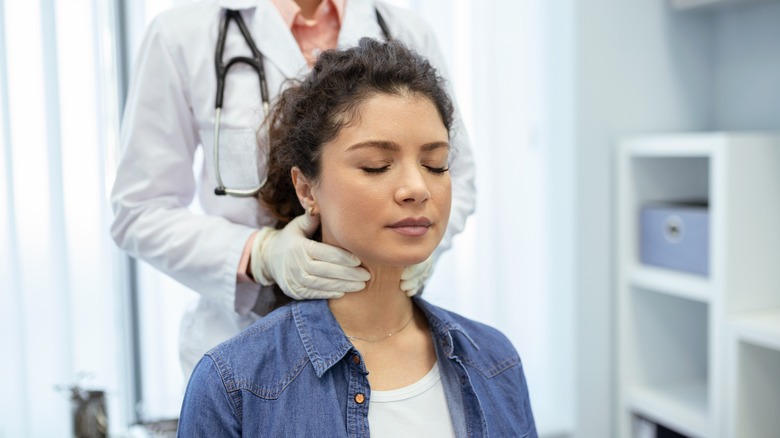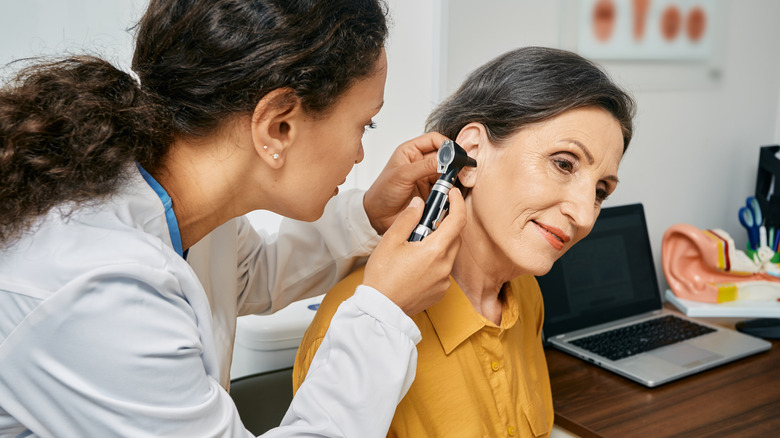What It Means When Your Throat Makes A Clicking Sound
The strawberry cheesecake at your favorite bakery is the thing that dreams are made of. However, during your first bite, you experience a strange clicking when you swallow. While a sudden click might be setting your anxiety to a high level, there are several reasons you might be hearing a clicking, like a clicking hyoid bone, TMJ disorder, or eustachian tube dysfunction. Understanding the act of swallowing and the parts involved can give you a better understanding of what part might be clicking.
According to the Physical Medicine and Rehabilitation Clinics of North America, swallowing is a complex process that includes reflexive activities of several nerves and muscles. The food moves from the oral cavity to the esophagus to find its way down to the stomach. Some muscles and anatomy involved include the hyoid bone, thyroid cartilage, and palatopharyngeal muscles. Structural abnormalities in these areas can lead to clicking and even pain when you swallow your morning coffee or favorite foods.
We'll help you find out where to look for the origin of your clicking when you swallow. We'll also go over specific helpful treatment options so you can swallow with ease.
Your hyoid bone could be clicking
Clicking when you swallow can be a hard one for doctors to figure out, given the different mechanisms of swallowing. However, one of the first areas to look at is the hyoid bone, per a 2015 study in the National Journal of Maxillofacial Surgery. A syndrome called a "clicking larynx," which is considered to be a rare condition, happens when the hyoid bone enlarges and rubs on the cervical vertebrae when the person swallows. Given the friction, the rubbing of the two can cause the person to experience pain when they eat or drink.
The reason behind the enlargement of the hyoid bone is typically due to trauma. A clicking larynx can also be attributed to a shortened distance between the hyoid and thyroid cartilage, per a 2021 study found in Auris Nasus Larynx.
Regardless of the cause, imaging is required to help figure out exactly why the hyoid bone is rubbing. Treatment for the clicking can take a conservative approach by manipulating the neck bones to help alleviate the friction. It also might require surgical intervention to relieve the friction causing the clicking, like shaving down the hyoid bone.
Clicking throat may be related to TMJ
The clicking experienced when you swallow might not even come from the throat or larynx, however. It could be coming from the jawbone. Popping jaw is a common symptom of temporomandibular joint (TMJ) disorder. The clicking noises come from the jaw as it moves. So, you might be moving your jaw as you swallow, which leads to the clicking that you're hearing.
TMJ disorders also include muscle pain along the cheeks and temples, according to Trimmell Anders & White Orthodontics. The pain can be related to grinding your teeth during the night, meaning you feel soreness and stiffness when you wake. According to the Cleveland Clinic, other symptoms can include headaches, earaches, and neck pain.
Treatment of TMJ disorders depends on the severity of the symptoms. For example, changing your posture and minimizing wide jaw movements can help, especially for those who experience locking of your jaw. Penn Medicine also notes that reducing stress, exercising your jaw, and using hot and cold compresses can be beneficial. Massage and therapy, like transcutaneous electrical nerve stimulation (TENS), can stimulate the jaw. Those with severe TMJ disorders might require surgery like arthrocentesis, which removes fluid on the jaw joint, or arthroplasty, which repositions the jaw.
Eustachian tube dysfunction may be to blame
Sometimes, the noise you hear doesn't have anything to do with your throat. It's the act of swallowing that's affecting your ears. Crackling or popping when you swallow is a common symptom of those with an eustachian tube dysfunction (ETD). Your ears have a tube in the back of your throat that opens and closes. It's vital for pressure balance in the ear, drainage of fluid, and protecting you from hearing all the sounds of your body, per Johns Hopkins Medicine.
However, when you have a dysfunction in this tube, it can lead to pain and pressure in the ear. It can also cause a popping or cracking sound when you swallow. According to Cleveland Clinic, about 1% of adults have this disorder, which comes in different varieties. Patulous ETD means the tubes stay open, while obstructive ETD means they stay closed. The third type, baro-challenge-induced ETD, means the eustachian tubes don't open appropriately at certain altitudes.
Allergies, colds, and viruses typically cause ETD, but it can be irritated by GERD or acid reflux. Additional symptoms include ringing in the ears, hearing problems, and dizziness. Medications to help with inflammation are beneficial to help open up the tubes. Severe cases may require surgery.




